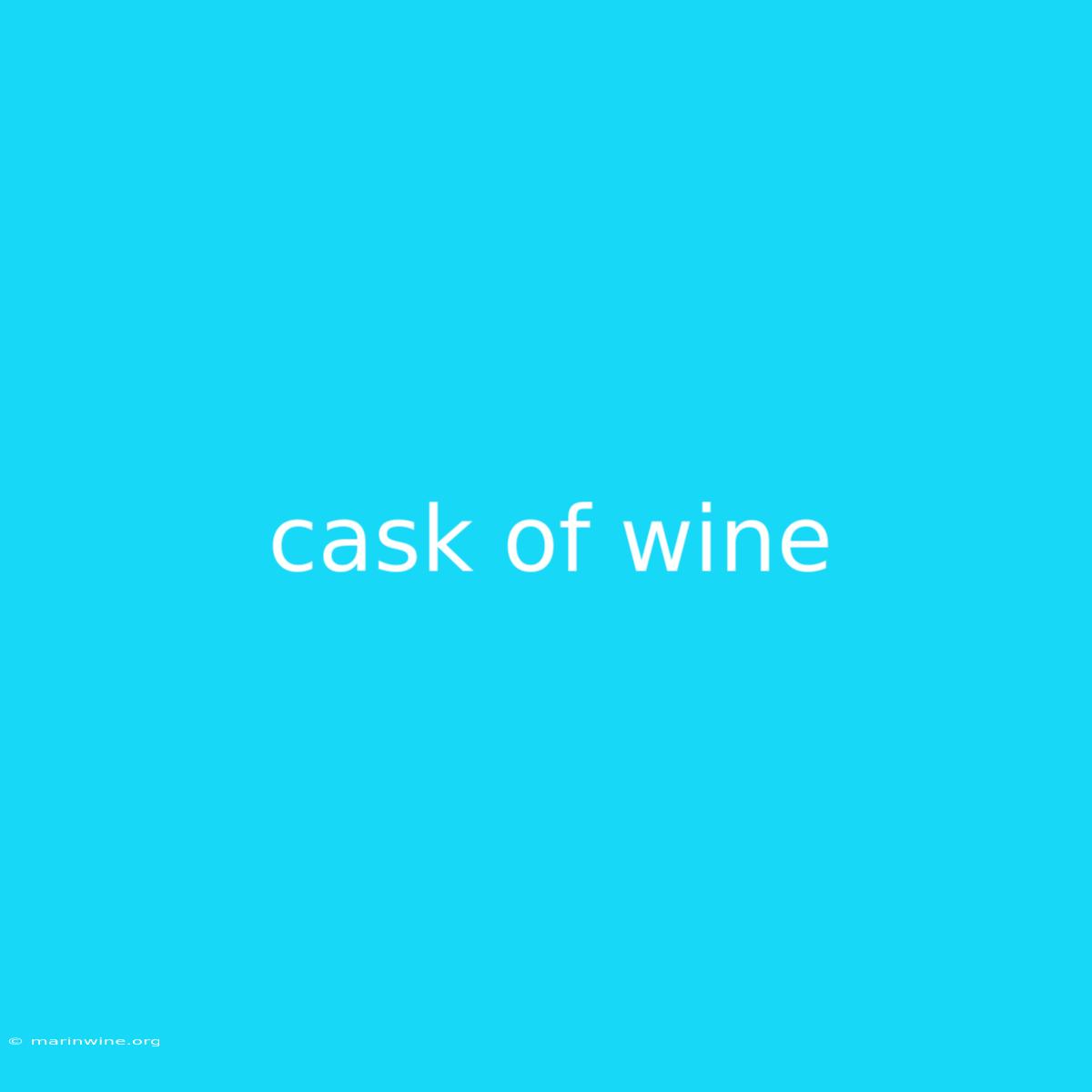Uncorking the Mystery: A Deep Dive into the Cask of Wine
Have you ever wondered what secrets lie hidden within a cask of wine? These wooden vessels, steeped in tradition, hold more than just delicious liquid; they house stories of time, craft, and transformation. This article delves into the captivating world of the cask, exploring its significance in winemaking and uncovering the intricate processes that create a truly unique drinking experience.
Why It Matters: Understanding the cask's role is crucial for appreciating the full spectrum of wine flavors and complexities. The cask's impact on a wine's character goes beyond simple storage; it involves a dynamic interplay of wood, oxygen, and time that shapes the final product.
Key Takeaways of Cask of Wine:
| Aspect | Description |
|---|---|
| Wood Type | Oak, chestnut, acacia, and cherry are common cask materials, each imparting unique flavor profiles. |
| Toasting | The level of heat applied to the cask's interior influences the amount of flavor compounds released, impacting the wine's aroma and taste. |
| Age | Cask age significantly affects its flavor profile. Older casks offer a softer, more nuanced influence on the wine. |
| Size | Cask size determines the wine's contact with wood and oxygen, impacting the pace of aging and flavor development. |
| Impact on Wine | Casks impart flavors like vanilla, spice, toast, and tannins, adding complexity and depth to the wine. |
The Cask: A Winemaker's Canvas
The cask's significance lies in its ability to act as a catalyst for the wine's evolution. It's not merely a container but a dynamic element that contributes to the wine's transformation over time.
The Wood: A Flavorful Foundation
The chosen wood type forms the foundation of the cask's influence. Oak, a perennial favorite, imparts notes of vanilla, spice, and toast, while chestnut adds earthiness and a hint of bitterness. Each wood type brings a unique flavor profile, contributing to the wine's character.
The Toasting: Unleashing the Flavor Potential
Toasting the cask's interior enhances its influence on the wine. This process involves exposing the wood to heat, releasing flavorful compounds that impart a range of aromas and tastes. Light toasting creates subtle notes, while heavy toasting introduces bolder flavors. The toasting level is carefully chosen by the winemaker to complement the specific grape variety and desired flavor profile.
Age: Time's Gentle Hand
The age of the cask also plays a vital role in shaping the wine's character. Older casks have undergone multiple wine fermentations, resulting in a gentler, more nuanced influence on the wine. Their wood has mellowed, imparting subtle flavors that complement the wine's complexity.
Size: A Matter of Influence
The size of the cask determines the wine's exposure to wood and oxygen. Larger casks provide less surface area for the wine to interact with the wood, leading to a slower aging process and a gentler impact on flavor. Smaller casks, conversely, accelerate the aging process, resulting in bolder, more pronounced flavors.
Beyond the Barrel: The Cask's Legacy
The cask's influence extends beyond the initial aging process. Even after the wine is bottled, the legacy of the cask lives on, contributing to the wine's development over time. The interaction between the wine and the cask during aging creates complex layers of flavor that continue to evolve in the bottle, rewarding patient wine enthusiasts with a dynamic tasting experience.
FAQ for Cask of Wine:
| Question | Answer |
|---|---|
| What is the best wood for a wine cask? | The ideal wood depends on the specific grape variety and desired flavor profile. |
| How long does a wine typically age in a cask? | Aging times vary depending on the wine style, grape variety, and desired flavor profile. Some wines age for months, while others may age for years. |
| What happens to a cask after it's used? | Casks are often reused for subsequent vintages. However, their influence diminishes over time, and they may be eventually repurposed for other uses. |
| Do all wines age in casks? | No, some wines are aged in stainless steel tanks or other containers to retain their fruit-forward flavors. |
| What are the benefits of cask aging? | Cask aging adds complexity, depth, and nuanced flavors to the wine. |
| How can I tell if a wine has been aged in a cask? | Look for tasting notes like vanilla, spice, oak, or toast on the wine's label or in reviews. |
Tips for Enjoying Cask-Aged Wines:
- Explore different cask-aged wines: Experiment with wines aged in various wood types and toasting levels to appreciate the diverse flavors they offer.
- Pair with food: Cask-aged wines often complement dishes with rich flavors, like red meats, roasted vegetables, and cheeses.
- Consider the wine's age: Younger cask-aged wines may have strong wood flavors, while older wines will exhibit a more nuanced and integrated profile.
- Store properly: Keep cask-aged wines in a cool, dark place to preserve their delicate flavors and ensure optimal aging.
- Decant if necessary: Decanting allows the wine to breathe and release its full aroma and flavor profile.
Summary by Cask of Wine:
This article has unveiled the intriguing world of the cask, exploring its crucial role in shaping the character of wine. The cask's wood type, toasting level, age, and size all contribute to the wine's flavor profile, creating a dynamic journey from grape to glass. By understanding the cask's influence, wine enthusiasts can unlock a deeper appreciation for the intricacies and complexities of the winemaking process and savor the unique qualities of cask-aged wines.
Closing Message: As you uncork a bottle of cask-aged wine, remember that each sip is a testament to the time, craft, and collaboration between nature and human ingenuity that brings this exquisite drink to life.

